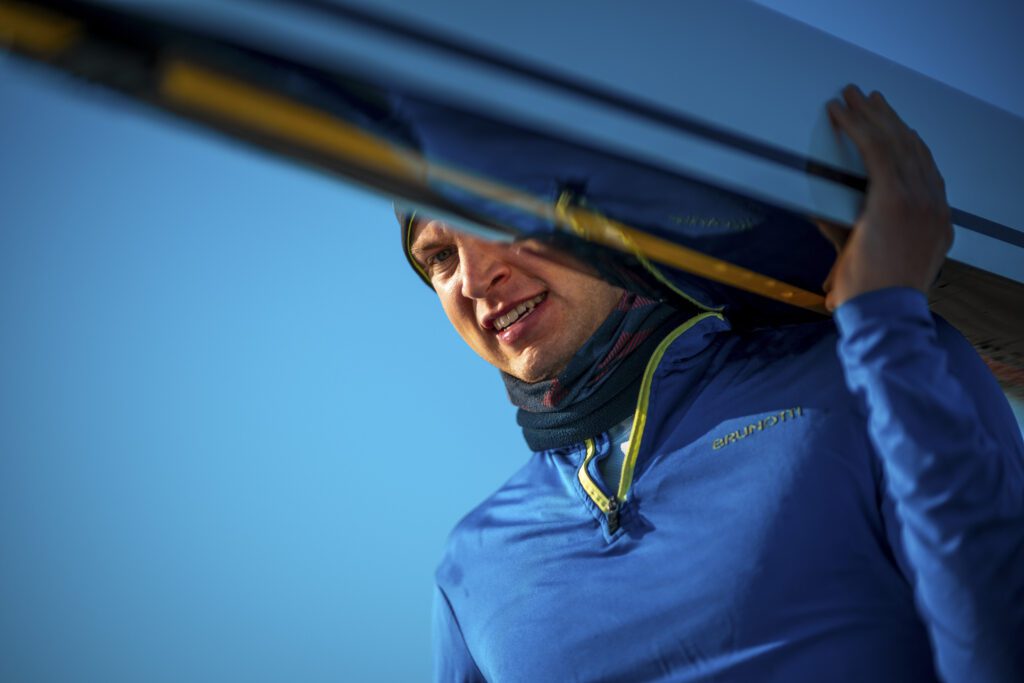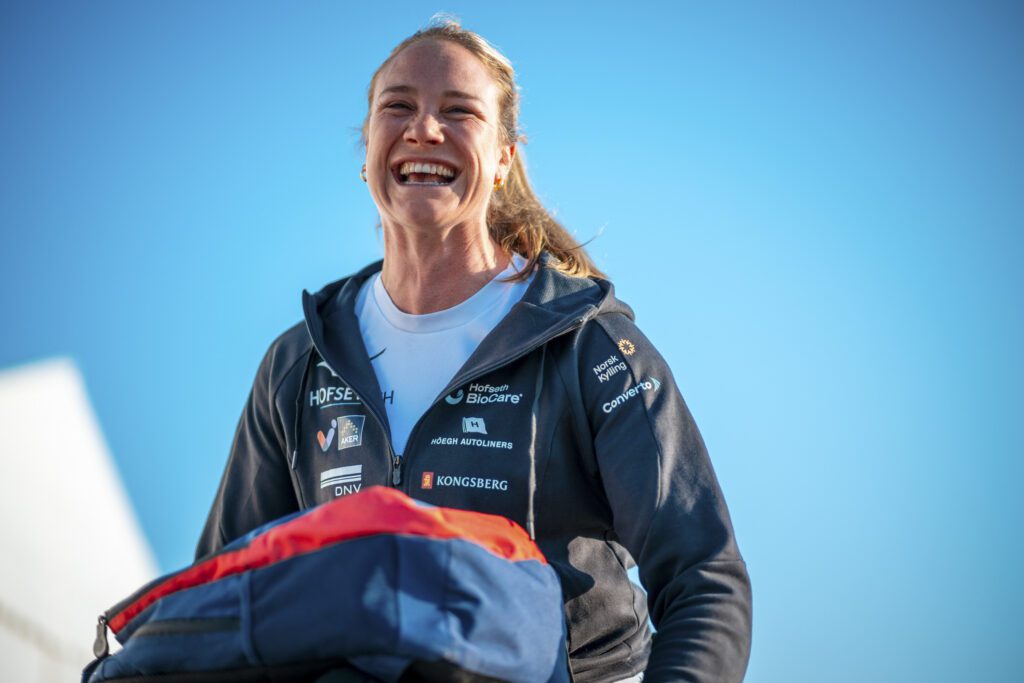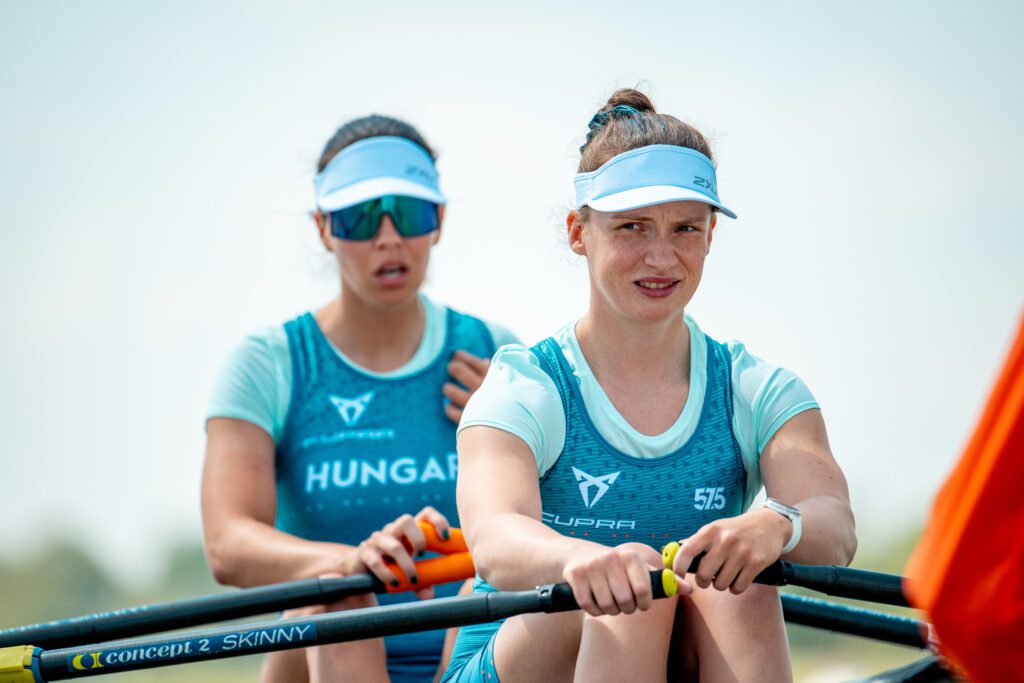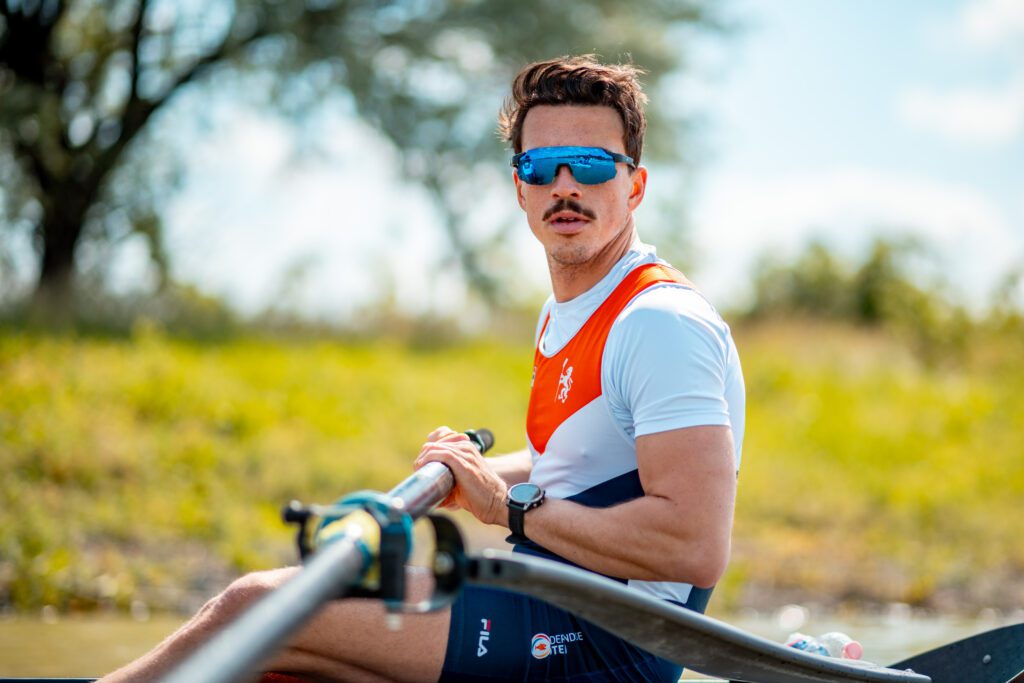Twelve more European Rowing Champions crowned and several European Championship Best Times smashed. The finale of the 2023 European Rowing Championships saw Great Britain top the medal table.
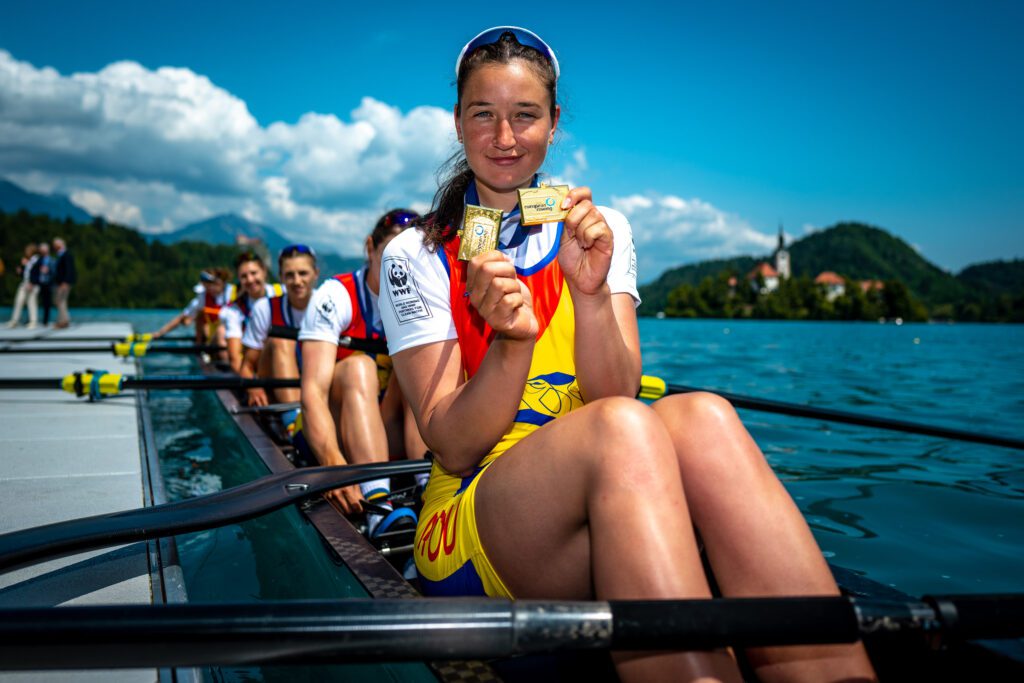
Photo ROU W8+
Credit Benedict Tufnell
Seventeen nations in total collected medals across the two days of finals, with Great Britain winning five gold, three silver and two bronze. Romania equalled Great Britain’s gold tally, and also took a silver. Meanwhile, the Netherlands claimed the most medals, eleven in total; two gold, five silver and four bronze.
The Lierop miracle
It would have been a bold call not to back either the German world champion Olli Zeidler or Greece’s Olympic champion Stefanos Ntouskos to win the men’s single sculls. As the race progressed Denmark, Bulgaria, and Lithuania dropped off the pace. However, Lennart van Lierop persisted – stubbornly sticking to the Olympic and world champions to his right. With every stroke his supporters dared to dream, then believe, and eventually witness a Lierop miracle.
Before crossing the line to be crowned European champion, the Dutch sculler continued to juggle his catches in the bounce, while simultaneously booting the hell of out of his hull. A quick glance at 1880m confirmed what must have felt like the impossible just days earlier, he was leading the very best Europeans scullers.
2023 European Rowing Championships, in pictures
“I tried to stay composed and don’t let it get in my head: that was the critical part,” said Lierop, “even when the water was terrible and the strokes were rubbish, to just keep on grinding, one stroke at a time.”
“I felt the waves coming from all different directions. It was tough but I tried to do my best and to keep pushing. I am very proud that I made it,” said the Greek silver medallist. What was going through his head in the last 500m? “Get past Germany. Keep pushing him and be a little bit in front by the end.”
“It was one of my better races in tough conditions,” said Zeidler. “I nailed the start this time but the middle thousand could have been more stable. I felt the motorboat waves throw me from one side of the lane to the other. It was difficult to get into a rhythm and use my strength. I tried to save energy but at the end there was too much tension in my arms and I couldn’t deliver my final sprint.”
Never underestimate the dutch single (part two)
One the women’s side Switzerland’s Aurelia-Maxima Janzen took an early lead but the Dutch world and European champion, Karolien Florijn, pulled level before the first marker. The two leaders were clear water ahead of the chasing pack. By halfway Servia’s Jovana Arsic clawed back overlap on Janzen, and was half a length ahead of Bulgaria. Florijn crossed the finish five seconds ahead of Switzerland. Bulgaria missed the podium by less than 0.5s to the Serbian bronze medal winner.
“It is my first medal in a big competitions,” said Arsic. “I felt good for the final. I’ve never been this focussed before. This year I decided to give everything in training. This is just the start!”
“I tried to keep it clean and not make any mistakes,” said Florijn. “Now, we have a one week holiday. This was a little peak but I’m not in my best shape and I hope I can step up and be better at the worlds.”
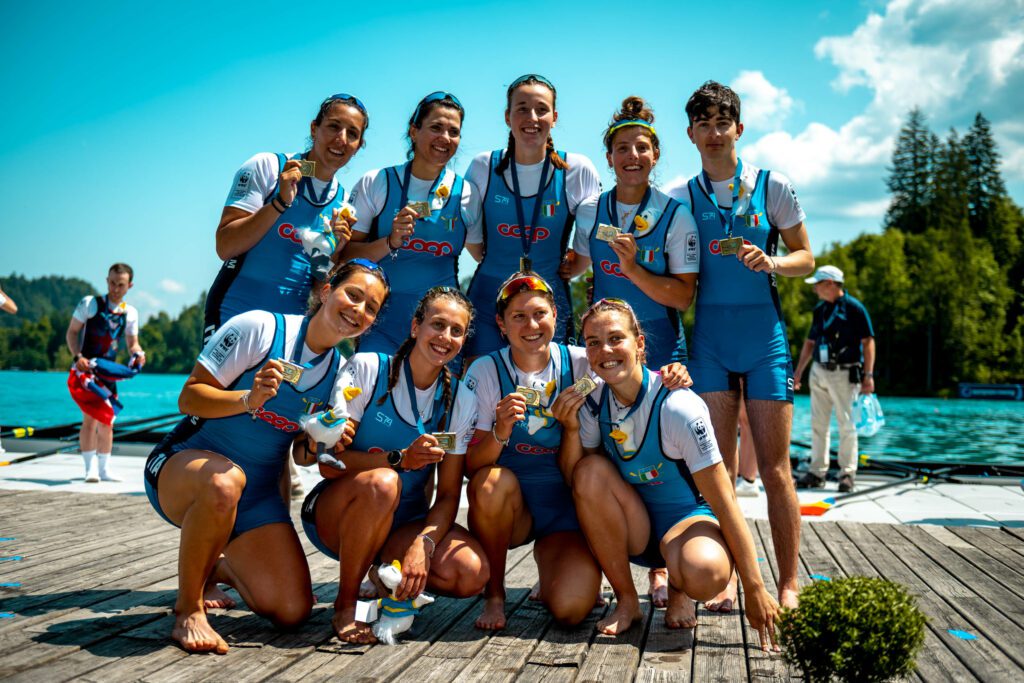
Photo ITA W8+
Credit Benedict Tufnell
Great Britain’s formidable fours
Great Britain dominated the men’s four despite Romania blasting out of the blocks at 51spm. “We didn’t put too much pressure on ourselves,” said Matt Aldridge. “We were dropped in the first 250m but we knew that would happen. We believed in our mid-race pace and kept moving. It got a little bumpy at halfway. I don’t know if the video is going to look good. Christian [Felkel, GBR M4- coach] might have a few words about that!”
A length behind Great Britain the race for minor medals saw Romania miss out and France secure bronze behind the Dutch. “Stay closer to the British,” was the French plan according to Guillaume Turlan. “At 750m [to go] we saw an opportunity and did a good burst, which made a impact. It was neck and neck for the last 200m but we did it!” The last time France won a European medal in this event was at Glasgow in 2018.
Perhaps, France’s M4x bronze eased the disappoint of watching their Olympic and world champion men’s double finish 1.78s behind Moldova in the B-Final.
There was an unusually tight contest in the PR3Mix4+, a boat class dominated by the Brits. Great Britain won gold, five seconds ahead of Germany who beat the bronze medallists France. “I’m proud and pleased to be back,” said Erin Kennedy, who has successfully undergone surgery for breast cancer since winning the 2022 Europeans in Munich.
Our full coverage of the 2023 European Rowing Championships
“We’ve all been a part of Erin’s journey over the last year,” said her teammate Ed Fuller. “It’s an incredible moment. The gap was a bit smaller than what we are used to but at the end of a day a win is a win.”
Germany were pleased too. “We are very happy with the outcome. It is a great season opener,” said Jan Helmich.
Great Britain secured a second gold in the para boat classes via the PR2 Mix2x. The new line-up of Lauren Rowles and Gregg Stevenson secured a new European Championship Best Time. They beat the Netherlands by six seconds, who beat Ukraine’s bronze medallists.
“We have so much fun rowing together,” said two-time Paralympic champion Rowles. “Honestly, it has been an absolute blast. He turns up every single day, and has the determination and perseverance to make this boat go faster. He has given me a lease of life to do the same. We had a really good time out there today.”
“We executed our plan well,” said Stevenson, who made his international debut. “I’ve not slept all week, I’m flying on adrenaline and coffee. It has been a heck of a learning curve.”
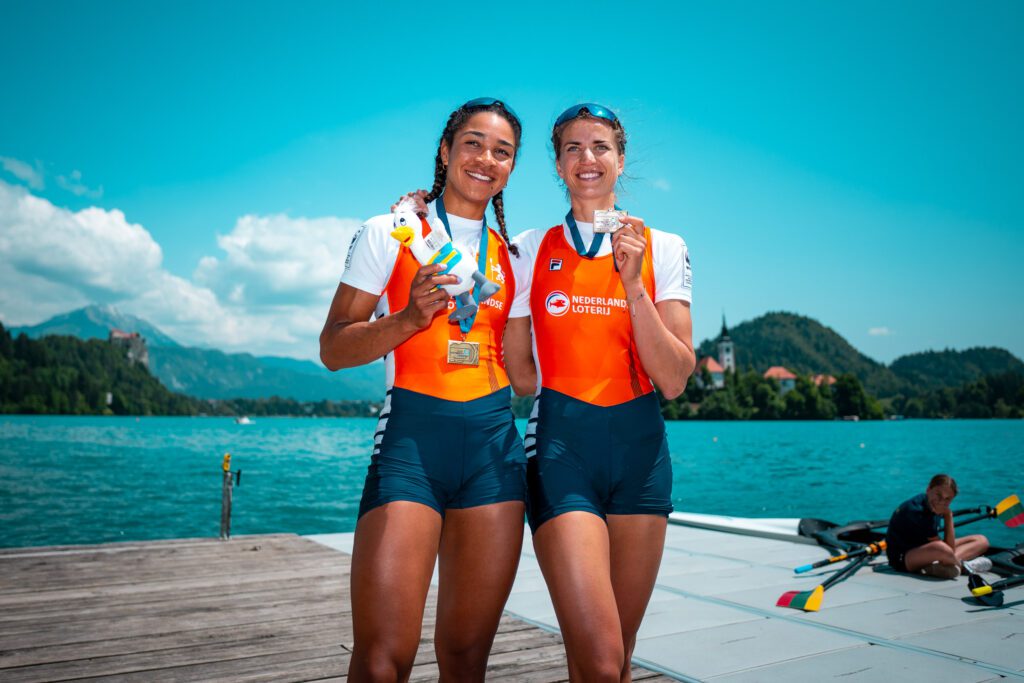
Photo NED W2x
Credit Benedict Tufnell
Lightweight singles
France’s Hugo Beurey claimed the first gold medal of the day, flanked by Switzerland and Italy, and set a new European Championship Best Time having been pushed by Italy’s Niels Torre. Torre made his move in the middle thousand, but the French sculler finished strongly in the final few hundred. Switzerland’s Andri Struzina denied Slovenia’s hometown hero Rajko Hvat a spot on the podium.
In the LW1x Switzerland’s Eline Rol was the quickest out of the blocks but slid to sixth by the finish. Greece led through the middle but could not hold off the defending European and world champion from Romania, Ionela Cozmiuc. “It was a tough race, I’m glad I managed to win it,” said Cozmiuc who set a new European Championship Best Time. “I have trained hard and this race was a good one.”
Our full coverage of the 2023 European Rowing Championships
“I am racing against the best athletes so it is difficult. I tried my best,” said Greece’s Evangelia Anastasiadou. Czechia’s Kristyna Neuhortova finished strongly to win bronze, just 0.23s ahead of Ireland. “It was very hard. Four boats for one place!”
Roll on Romania: Another ferocious finish
The Dutch women’s pair were the next to fall to a Romanian sprint finish. Ioana Vrinceanu and Roxana Anghel soared above 40spm to pass the Netherlands; Ymkje Clevering and Veronique Meester accepted their fate a buoy line before the finish. Croatia’s Jurkovic sisters were unable to hold their early speed, which allowed Spain to slip by for a bronze medal. Great Britain finished fifth, ahead of Germany.
“It was a good day,” said Romania’s gold medallist Vrinceanu, “the conditions were not a problem for us”. “In the pair you have to really work together and if one person doesn’t get their stroke right, then you are little bit screwed,” said the Netherland’s Clevering.
“We still don’t know where the limit is,” said Spain’s Aina Cid. “I think we have something here. We have to qualify this year, but I hope we will see our best at the Olympics.” Her new teammate Zamorano added: “It is cool to be rowing with someone who has twice been to the Olympics in this event. We are both learning from each other but when it is time to race I know I can trust Aina.”
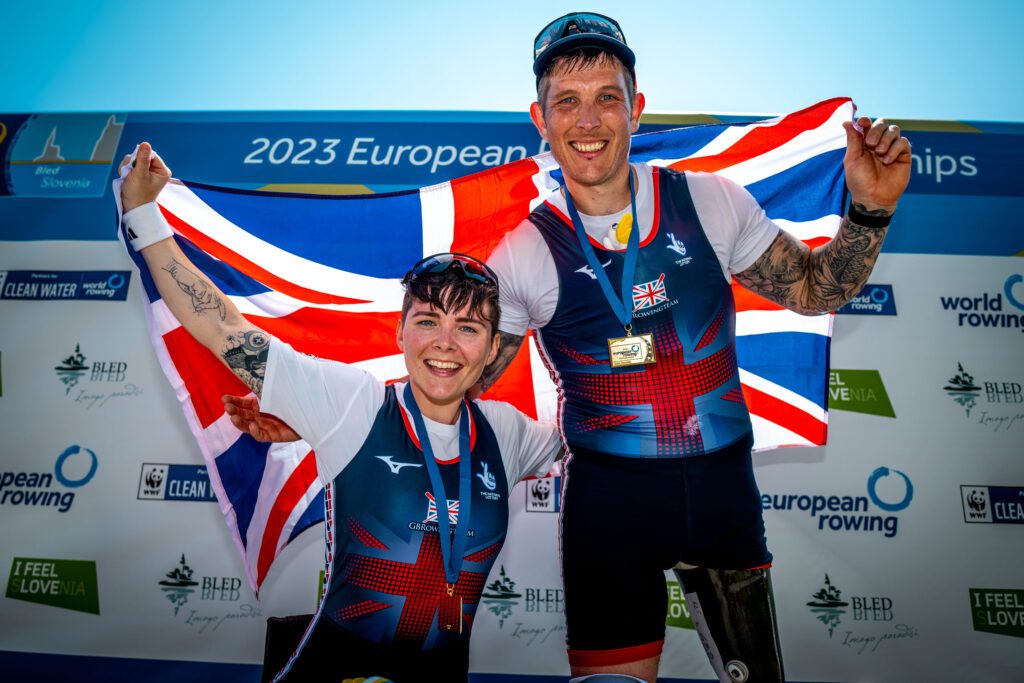
Photo PR2 Mix2x
Credit Benedict Tufnell
Swiss sensation
Switzerland had a poor start in the men’s pairs, dragging themselves over the buoy line before surviving two mini-crabs in the first few hundred meters. Great Britain led the early stages of the race but not by much. As the crews approached the final 500m, less than a second separated Spain, Switzerland and Great Britain. It narrowed at the finish as four boats fought for three medals. On the surge Switzerland nudged their bowball over the finish line first, 0.01s ahead of Great Britain who beat Spain. Lithuania finished fourth.
“Three quarters of the race was really good, and the last bit wasn’t bad, but you’ve got to close out the race when you’re half a length up,” said Great Britain’s Tom George. “That’s the frustrating bit. We didn’t have a great run-in but we wanted to win here even without the best prep.” “It was tough conditions but that’s the same for everyone,” added George’s teammate Ollie Wynne-Griffith. “It would have been nice to come away with the win, but it’s tight margins. A lot of our men’s sweep squad know that after this weekend.”
“After the crab a new rhythm came back, and this gave us confidence,” said Switzerland’s Roman Röösli. “I knew if we could stay [in touch] we’d have the last stroke of the sprint. We always have our sprint.” Will they stay in the pair? “That’s a great question for our coach!”
“I’m very happy,” said Spain’s Javier Garcia Ordonez. “The conditions were very hard but it is our second medal this year.”
Business as usual (just!)
For 1500 meters the Lithuanian women’s double led the Olympic, world, and European champions, Ancuta Bodnar and Simona Radis. The three frontrunners, Lithuania, Romania, and the Netherlands, distanced Ireland, Germany, and France. As Romania launched themselves at the finish line, Lithunia desperately tried to retain the led and the Dutch fell off the pace. Barely a foot in it. Romania snagged gold in the dying strokes and secured a new European Championship Best Time of 6:40.3.
“Coming to the finish our hands couldn’t hold the oars properly,” said Lithuania’s Donata Karaliene. “We didn’t manage the finish well; we were so tight in the arms. Our oars slipped a few times, over the course, but we didn’t crab.”
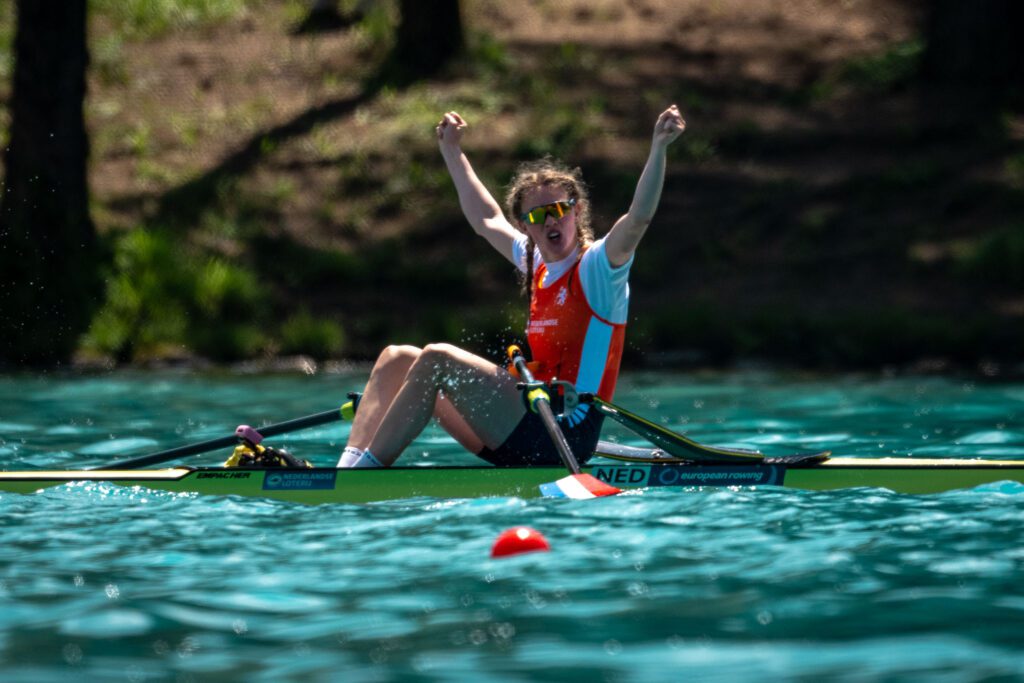
Photo NED W1x
Credit Benedict Tufnell
“The first kilometre was actually quite good and we were able to race the Romanian double, so I think that went to plan. But in the second kilometre we lost the control, and that leads to a loss of speed,” said Dutch sculler, Laila Youssifou. “We knew Lithuania were quick. I was a bit surprised that they were in front of the Romanians for such a very long time but at the end of the day that’s speed we are also aiming for, so it is good to see that they are capable of doing it.”
Sinkovic brothers draw upon their quad days
Belgium’s quick-starting Under 23 champions were soon overtaken by the Sinkovic brothers, who commanded the field with their strong mid-race pace. The Dutch, Italian, and Spanish crews vied for position just behind, but with 750m to go Italy’s Luca Rambaldi and Matteo Sartori moved ahead. Croatia channelled their quad-racing days to unleash a mighty sprint, coming from half a length down to half a length up to win gold in the final 250m.
“The Italians were really, really fast. In the last 500m we smelt that they were dying a little bit – so we gave it our all,” said Valent Sinkovic. “It is the best feeling, especially when you win in a close race.”
“I feel very confident in this boat. I’m surprised that we won silver because there are a lot of athletes in this boatclass, who have a lot of experience and a lot of medals,” said Rambaldi. “But we have nothing to lose.” The Italian plan was a simple one, “start strong, and continue stronger!” said Rambaldi but admitted, “we didn’t have anything left in our bodies in the last hundred”.
“We will look if we can find more speed,” said the Netherlands sculler, Melvin Twellaar. “We will spend more hours rowing together. Hopefully we can make a step to Lucerne.”
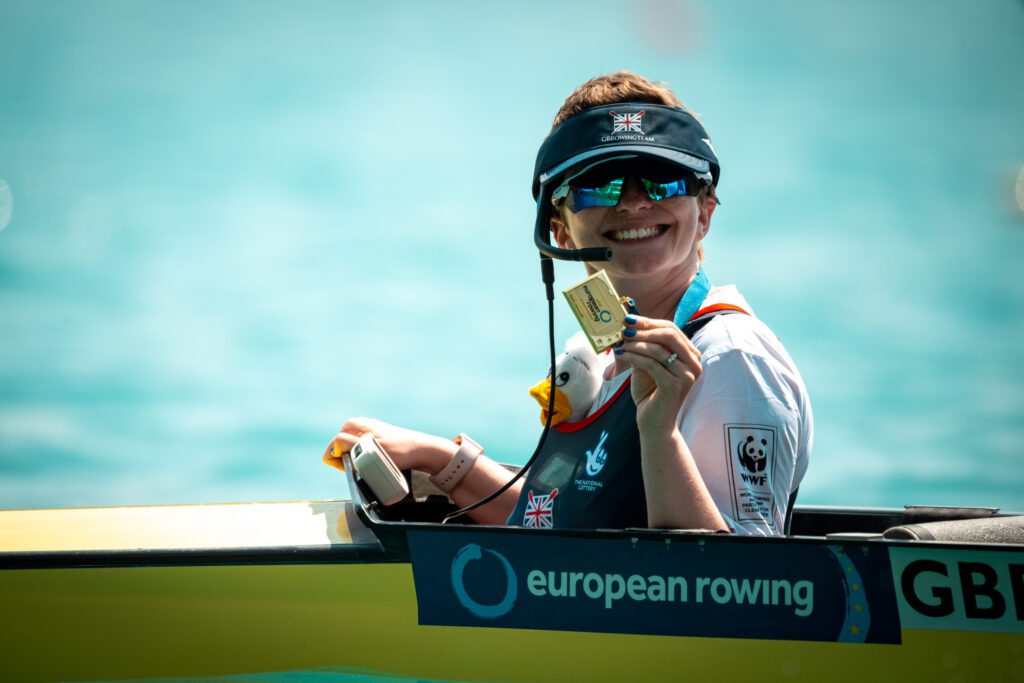
Photo GBR Mix4+
Credit Benedict Tufnell
Romania rule the women’s eights
Simona Radis, who an hour earlier had won gold in the women’s double, stroked the Romanian women’s eight to a gold medal and a successful defence of their title. In typical fashion they rated high, 50spm, from the get-go but it was the British who led at the first 500. Romania re-took the lead in the second quarter and continued to march away until the finish. Italy beat Germany by 5s to claim bronze.
“It is a great first step in the season. We’ve a line in the sand and we are going to move on,” said Great Britain’s Esme Booth, who raced in the women’s pair two hours earlier. “The adrenaline carried us through the second race.”
“That was a really good race,” said Italy’s Linda De Felippis. Her eight spent several practice sessions on Lake Bled as a six because Giorgia Pelacchi and Veronica Bumbaca doubled up in the pair. “The preparation was not so easy. That was a really satisfying race.” Pelacchi, added, “We are proud and happy, it is an important medal for the Italian women.”
